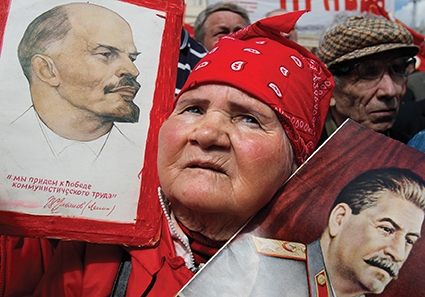Stalin Resurrected?
Op-ed
There are so many historical personalities that have seriously influenced life on earth, but for some reason, without even a tinge of exaggeration, Joseph Stalin is one of the most talked and written about dead political figures among them all. Most reference books would mention him as a ‘soviet dictator’. Why is he so talked about? What is so specifically controversial about him? The answer to this question cannot be sought for in a tiny article by a non-specialist like the author of these lines. The response should probably be fished for in hundreds of books and thousands of articles that had been published about old Uncle Joe.
Here is a sample of his latest approval ratings: 58% in Russia, 57% in Georgia and 37% in Armenia. Let us trust this internet data for a second and make comment: in Georgia, this is understandable because Stalin’s adulation here is based on his ethnic Georgian origin. The same in Armenia: Stalin’s low rating here is also the consequence of an ethnic attitude. Had the former soviet boss been an Armenian, his ratings would have been at least twice as high in Hayastan. Yet, the former Kremlin highlander’s sky-rocketing ratings in Russia comes as a big surprise. Why do the Russians cherish the Red Tsar’s dark memory so much? On December 21, Stalin’s birthday, the Internet was infested with material about the erstwhile Dear Father. Where does this uncanny nostalgia for the Soviet Vozhd come from? Why are the Russians interested in the reinstatement of the once defamed generalissimos? Maybe the Russians crave the governing style of the Man of Steel because what Russia needs today most is discipline in ruling the country. Stalin is indeed said to have been a man of modesty and discipline, imposing law and order on his own self in the first place and then on the entire soviet people and the newly-created USSR.
There might be another reason for well-known Russian political analysts’ intensive deliberation on the image and legacy of this giant communist figure of world history: the imperial character of the Russian nation, to which the current Russian president is playing so actively, does not want to put up with the decline of its clout on global events, thus is trying to regenerate the lost influence by bringing back to life the powerful Stalinist dictatorial hand.
I wonder if the vicious tyrant is purposefully being turned by Russians into the nation’s biggest hero and the symbol of national greatness. One of the dominating thoughts here is that the attempt of Stalin’s renaissance could be a prerequisite for the realizing of Putin’s latent dream of resuscitating the good old country of soviets. Russia is a weird place to live in, and anything can happen there.
There are many thoughtful heads today, living in the former soviet land, that would see the fallen Soviet Union back in action with great pleasure, but the world doesn’t take this wild idea very seriously. Stalin’s restored potent image might very well work as an effective banner for turning words into the deeds, but the rehabilitation of the Soviet conglomerate, especially the soviet autocratic regime, seems to be practically impossible at this stage of global development. I don’t think the raised Stalin could serve as enough ideological force to put together what was recently nicknamed the Evil Empire. On the other hand, many would think that Georgia, for example, felt better in those brutal times than now because its territorial integrity was intact. Understandably, territorial integrity is crucial for us, but the overwhelming modern logic is that looking back is sick, and only looking forward is healthy. So, if Russians want to look back and feel nostalgic about the bygone vicious times, let them do so. They are headstrong, and we can’t do anything about it. No more pain for us! Enough is enough!
Nugzar B. Ruhadze












